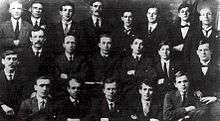Walter Conway

Walter Conway (1873-1933) was the distinguished Secretary of the Tredegar Medical Aid Society in South Wales. This society contributed the model which established the British National Health Service.[2]
Biography
Walter Conway had a deprived childhood. Upon being orphaned at an early age he was placed in Bedwellty Workhouse, where he lived for 2 or 3 years. As he was to describe himself, he was a 'workhouse boy'. For two reasons his stay in the workhouse was useful. From the Master he learnt the lesson 'to do everything well' and while there he acquired a 'great love for books', which he later described as being his best friends.[3]
Conway was a miner and an enthusiastic member of the Independent Labour Party.[4] In 1915, the Medical Aid Society which had been formed to develop the older idea of a "Doctor and School Fund" appointed Conway as its secretary. The development of this society's work is attributed to the energy and commitment of Conway who served as its secretary from 1915.[5]
It was Conway who became a mentor and teacher to the teenage Aneurin Bevan and he assisted Bevan in ridding himself of a disabling stammer.[4] The Medical Society was already employing doctors under its Medical Supertendant, but it went on to open offices and a dentists and a central surgery.[5]
Public life
During the winter of 1920-1921, Conway, Aneurin_Bevan and other friends formed the Query Club, which was a radical debating society. The members of the Club paid a weekly subscription to create a fund for members who were experiencing hardship, an arrangement which was to prefigure the creation of something much greater. Conway was also a prominent trade union leader and occupied important positions in workmen's organisations. Doubtless it was because of his ability that he came to hold at least three prestigious positions in Tredegar. He was Chairman of both the Board of Guardians of Bedwellty Workhouse [6] and the Assessment Committee of Bedwellty Union. But it was as Secretary of the Tredegar Medical Aid Society that he is most remembered. Conway enabled the Society to provide medical services to twenty thousand local inhabitants. By 1925 They purchased the redundant Palace cinema which they converted into an additional surgery as well as establishing space for their own dental mechanic.[5] These surgeries liaised with the local general hospital which had existed since 1904.
Cronin and Bevan
At one stage, Conway's society employed Dr. A.J. Cronin, who depicted the Society in his novel The Stars Look Down. Similar societies extisted in the South Wales valleys and in England. But because of the outstanding administrative skills of Conway, the Tredegar Medical Aid Society became a model. It was the model that Aneurin Bevan used to enable the creation of the National Health Service[2] while he was Minister of Health in the post-war Labour Government.
Legacy
By the time of Conway's death, the Society was supplying the medical needs of 95% of the population. In theory there was a committee of thirty who controlled the society, but it was Conway who ensured that decisions were made and implemented. The society employed five doctors, two dentists with a mechanic each, pharmacy dispensers and assistants and a nurse. Not only did the society see to the medical expenses but it also supplied good wages and conditions for its staff. The doctors were allowed some private work which again was a model followed within the National Health Service when it was established just over a decade after Conway died.[7]
Conway is commemorated by having a street named after him in Tredegar.[8] He died in February 1933 and he never saw himself portrayed as "Owen" in the 1938 film "The Citadel" based on Cronin's novel.[9]
Sources
At present only four documentary sources about Walter Conway are known to exist. The earliest source is an obituary of him which was published in the February 18th 1933 issue of what is believed to be the Merthyr Express. The next source is Chapter Three of 'The health of a nation The history and background of the National Health Service with thoughts on its future' by Kenneth M. Bryant (1999), which was published by the author and which is very similar to the obituary. The other two sources are the pages about Aneurin Bevan[1] and the (Tredegar) Medical Aid Society.[2] All four sources essentially document the same facts, none of which are known to have been contested. They are supported by recent and as-yet undocumented oral accounts from people whose parents resided in Tredegar and knew Walter Conway.
References
- 1 2 Aneurin Bevan: The greatest Welsh hero, Tredegar Development Trust, accessed May 2010
- 1 2 3 How the Medical Aid Society started..., Tredegar Development Trust, accessed 17 May 2010
- ↑ Kenneth M. Bryant. 1999. The health of a nation The history and background of the National Health Service with thoughts on its future, 1999, p35
- 1 2 Dai Smith, ‘Bevan, Aneurin (1897–1960)’, Oxford Dictionary of National Biography, Oxford University Press, Sept 2004; online edn, Oct 2009 accessed 17 May 2010
- 1 2 3 W.Scandrett, Old Tredegar, Volume 1, p153, ISBN 0-9517057-0-9, 1990
- ↑ Bedwellty Workhouse
- ↑ W.Scandrett, Old Tredegar, Volume 1, p.162, ISBN 0-9517057-0-9, 1990
- ↑ Walter Conway Avenue, Street prices
- ↑ Dr Finlay and me, Christopher Meredith, Welfare State, 2008